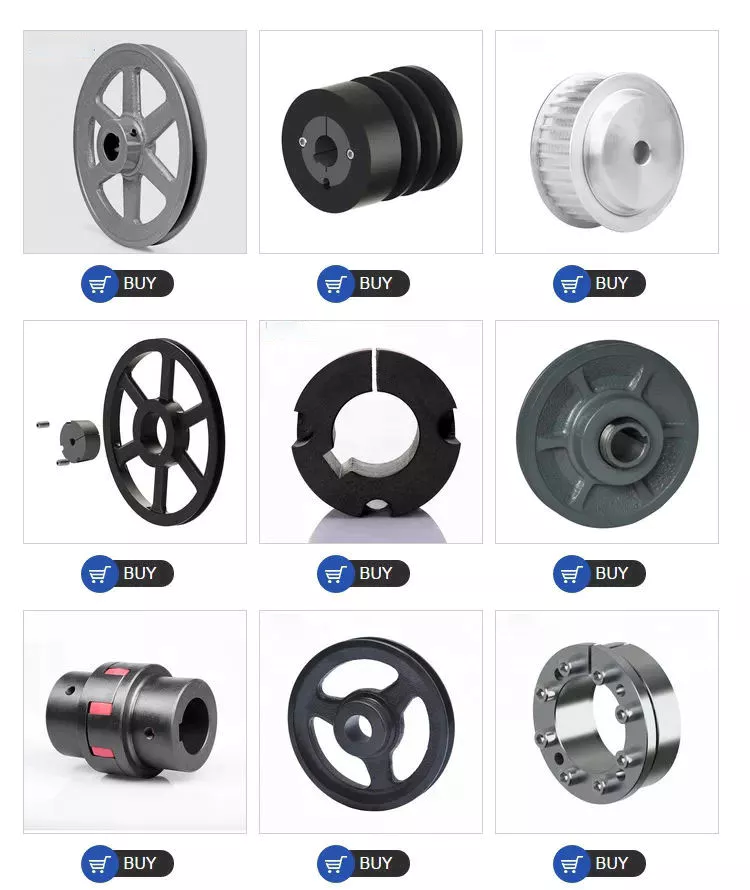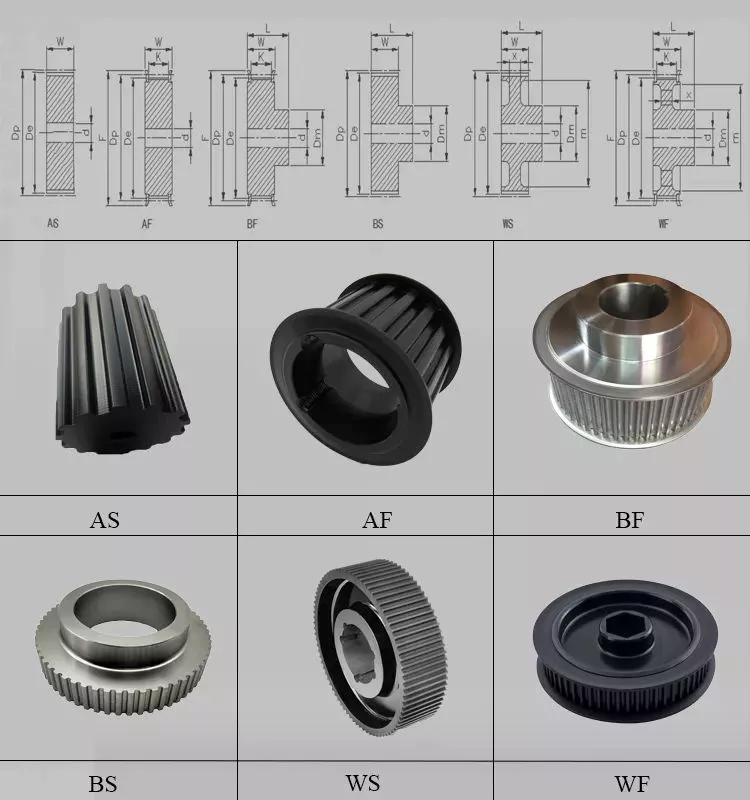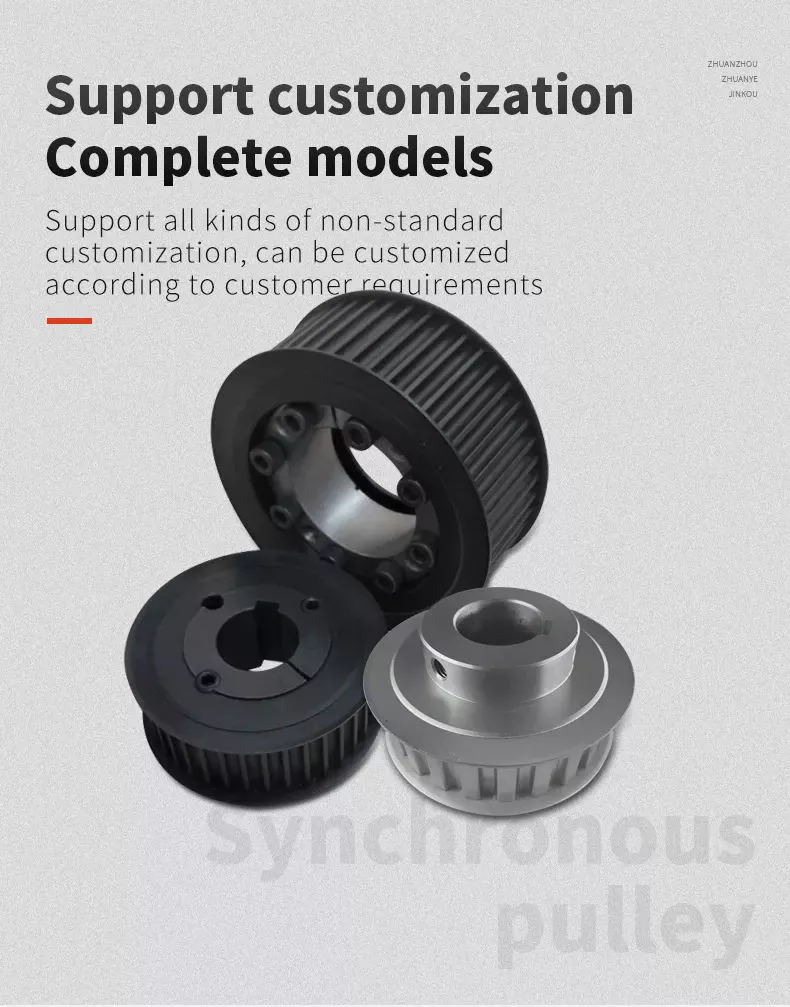Product Description
Factory Price High Precision Aluminum Timing Belt Pulley With Customized
We are HangZhou CHINAMFG Gear Machinery Co., LTD, and Newgear Planetary Transmission Co.,Ltd , My boss have 3 companies.
We are a large-scale manufacturer with 25 years of experience in manufacturing gears, synchronous wheels and reducers in HangZhou.
There are more than 500 employees.
HangZhou CHINAMFG Gear Machinery Co., Ltd. is HangZhou’s largest and leading gear transmission supplier in the Pearl River Delta. Famous-brand precision traditional enterprise in the industry. The main products include synchronous belt series. Precision gear grinding series. Three major areas such as planetary reducer series. Very Famous brand iHF, high precision. We can offer you pulley as your design.
Concentricity : 0.02-0.03mm
Main Features:
1. OEM/ODM tooth number from 10 to 72 timing pulley ,Or more teeth.
2. Material can be designed by customer requirement
3. High torque series S2M S3M S5M S8M P2M P3M P5M P8M
4. Normal torque series MXL XL L H
5. High precision drive series 2GT 3GT 5GT 8YU
6. Light load drive series T5 T10
7. Heave load drive series AT5 AT10
8. Clamping Timing Pulleys S3M S5M S8M
9.Good quality products
10.Competitive prices
11.Fast delivery
12.Best after-sale service
13.Brand: HeFa or OEM & ODM
14.Synchronous pulley shape:A /B/D/E/F/K
Basic Information:;
| Specification | Standard or Custom made |
| Material | Stainless steel,;,;brass,; carbon steel,; aluminum,; and so on.; |
| Surface Treatment | Zn-plating,; Ni-plating,; Cr-plating,; Tin-plating,; Copper-plating,; the wreath oxygen resin spraying,; black oxide coating,; painting,; powdering,; color zinc-plated,;blue black zinc-plated,; silver plating,;anodizing etc.; |
| Main Products | Precision spur gear,; Timing pulley,; Bevel pulley,; Worm& worm gear,; Timing Belt.;.; |
| Producing Equipment | CNC machine ,; automatic lathe machine,;stamping machine,;CNC milling machine,;rolling machine,; lasering,; tag grinding machine etc.; |
| Management System | ISO9001 – 2008 |
| Testing Equipment | Projecting apparatus,; Salt Spray Test,; Durometer,; and Coating thickness tester ,; 2D projector |
| Lead time | 10-15 working days as usual,; 30days in busy season,; it will based on the detailed order quantity.; |
| Delivery of Samples | By DHL,; Fedex,; UPS,; TNT,; EMS |
| Main Markets | North America,; South America,; Eastern Europe ,; West Europe ,; North Europe,; South Europe,; Asia |
| How to order | You send us drawing or sample |
| We carry through project assessment | |
| We give you our design for your confirmation | |
| We make the sample and send it to you after you confirmed our design | |
| You confirm the sample then place an order and pay us 30% deposit | |
| We start producing | |
| When the goods is done,; you pay us the balance after you confirmed pictures or tracking numbers.; | |
| Trade is done,; thank you!! | |
| Applications | Toy,; Automotive,; instrument,; electrical equipment,; household appliances,; furniture,; mechanical equipment,;daily living equipment,; electronic sports equipment,; ,; sanitation machinery,; market/ hotel equipment supplies,; etc.; |
Shipping
Contact person: Sunny.
We offer pulley, gear, gearbox. and other product.
OEM, ODM.
/* March 10, 2571 17:59:20 */!function(){function s(e,r){var a,o={};try{e&&e.split(“,”).forEach(function(e,t){e&&(a=e.match(/(.*?):(.*)$/))&&1
| Certification: | CE, ISO |
|---|---|
| Pulley Sizes: | Type B |
| Manufacturing Process: | Machining |
| Material: | Aluminum |
| Surface Treatment: | Electroplating |
| Application: | Chemical Industry, Grain Transport, Mining Transport, Power Plant, Printing |
| Samples: |
US$ 1/Piece
1 Piece(Min.Order) | |
|---|
| Customization: |
Available
| Customized Request |
|---|

How does the diameter of a pulley affect its mechanical advantage?
The diameter of a pulley plays a significant role in determining its mechanical advantage. Mechanical advantage refers to the ratio of the output force or load to the input force or effort applied to the pulley system. Here’s how the diameter of a pulley affects its mechanical advantage:
1. Larger Diameter: When the diameter of a pulley increases, the mechanical advantage also increases. A larger diameter means that the circumference of the pulley is greater, allowing a longer length of rope or belt to be wrapped around it. As a result, a larger pulley requires less effort force to lift a given load. This is because the load is distributed over a greater length of rope or belt, reducing the force required to overcome the load.
2. Smaller Diameter: Conversely, when the diameter of a pulley decreases, the mechanical advantage decreases. A smaller diameter means that the circumference of the pulley is reduced, resulting in a shorter length of rope or belt wrapped around it. As a result, a smaller pulley requires more effort force to lift a given load. This is because the load is concentrated over a shorter length of rope or belt, requiring a greater force to overcome the load.
It’s important to note that while a larger diameter pulley offers a greater mechanical advantage in terms of reducing the effort force required, it also results in a slower speed of the load being lifted. This is because the longer length of rope or belt requires more input distance to achieve a given output distance. On the other hand, a smaller diameter pulley offers a lower mechanical advantage but allows for a faster speed of the load being lifted.
The mechanical advantage of a pulley system can be calculated using the formula:
Mechanical Advantage = Load / Effort
Where “Load” refers to the weight or force being lifted and “Effort” refers to the force applied to the pulley system. By adjusting the diameter of the pulley, the mechanical advantage can be optimized to suit the specific requirements of the application, balancing the effort force and speed of the load being lifted.

What role do pulleys play in modern elevators and hoists?
Pulleys play a crucial role in modern elevators and hoists, enabling the smooth and efficient vertical movement of loads. They are integral components of the lifting mechanisms, providing mechanical advantage and facilitating safe and controlled operation. Here’s how pulleys are used in modern elevators and hoists:
1. Lifting Mechanism: In elevators and hoists, pulleys are part of the lifting mechanism that moves the load vertically. They are typically combined with cables, ropes, or belts to create a pulley system. By distributing the load’s weight across multiple lines and changing the direction of the applied force, pulleys make it easier to lift heavy loads. The number and arrangement of pulleys can vary depending on the specific design and requirements of the elevator or hoist.
2. Counterweight Systems: Modern elevators often utilize counterweight systems to offset the weight of the elevator car and reduce the amount of power required for operation. Pulleys play a crucial role in these systems by guiding the cables connected to the counterweight. As the elevator car moves up or down, the counterweight moves in the opposite direction, balancing the load. The pulleys in the counterweight system help distribute the weight and ensure smooth movement.
3. Traction Control: Pulleys are also involved in the traction control mechanism of elevators and hoists. Traction elevators use ropes or belts that pass over a series of pulleys, known as sheaves, to create traction. An electric motor drives the sheaves, causing the ropes or belts to move. By adjusting the rotational movement of the sheaves, the speed and direction of the elevator or hoist can be controlled. The pulleys in the traction control system enable precise and reliable operation.
4. Safety Systems: Pulleys play a crucial role in the safety systems of elevators and hoists. For example, in traction elevator systems, overspeed governors utilize pulleys to detect excessive speed and activate the safety brakes in case of a malfunction. The pulleys in these safety systems help monitor and control the elevator’s speed, ensuring passenger safety.
5. Maintenance and Service: Pulleys in modern elevators and hoists are designed to be durable and require minimal maintenance. They are often equipped with sealed bearings or other lubrication systems to reduce friction and wear. This ensures the longevity and reliability of the pulley systems, minimizing downtime and maintenance costs.
Overall, pulleys are essential components in modern elevators and hoists, enabling vertical movement, providing mechanical advantage, ensuring safety, and facilitating efficient operation. They contribute to the smooth and controlled lifting of loads, making elevators and hoists reliable and indispensable tools in various industries and buildings.

In which industries are pulleys extensively used?
Pulleys are extensively used in various industries for a wide range of applications. Here are some of the industries where pulleys find extensive use:
1. Manufacturing and Industrial: Pulleys are widely used in manufacturing and industrial settings. They are employed in conveyor systems for material handling, assembly lines, and production processes. Pulleys are also utilized in machinery and equipment such as pumps, compressors, generators, and conveyors. These industries rely on pulley systems for efficient movement of materials, power transmission, and mechanical advantage.
2. Construction and Engineering: The construction and engineering industries heavily rely on pulleys for lifting and moving heavy loads. Cranes, hoists, and winches utilize pulley systems to provide mechanical advantage and precise control over lifting operations. Pulleys are also employed in scaffolding systems, elevators, and material handling equipment used in construction projects.
3. Mining and Quarrying: In mining and quarrying operations, pulleys are used in various applications. They are utilized in conveyor systems to transport bulk materials such as coal, ore, and aggregates. Pulleys play a crucial role in mining equipment such as crushers, screens, and excavators, enabling efficient material handling and processing.
4. Transportation and Logistics: The transportation and logistics industries utilize pulleys in various ways. Pulleys are integral components in vehicles, including cars, trucks, buses, and trains. They are used in engines, power steering systems, alternators, and air conditioning systems. In logistics, pulleys are employed in conveyor belts and sorting systems for efficient movement of packages and goods in warehouses and distribution centers.
5. Agriculture and Farming: Pulleys have significant applications in the agriculture and farming sectors. They are used in machinery such as tractors, combines, and harvesters for power transmission and drive systems. Pulleys are also utilized in irrigation systems, grain elevators, and feed processing equipment.
6. Marine and Offshore: Pulleys find extensive use in marine and offshore industries. They are employed in shipbuilding, offshore drilling rigs, and maritime equipment. Pulleys are used in winches, cranes, anchor systems, and rigging applications. They enable safe and efficient lifting, lowering, and positioning of heavy equipment and cargo on ships and offshore platforms.
7. Energy and Utilities: The energy and utilities sectors utilize pulleys in power generation and transmission systems. Pulleys are used in turbines, generators, and power plants to transfer rotational motion and transmit power. They are also employed in renewable energy systems such as wind turbines and hydroelectric plants.
8. Entertainment and Stage Production: Pulleys have applications in the entertainment and stage production industries. They are used in theater rigging systems, concert stages, and amusement park rides. Pulleys enable the controlled movement of scenery, lighting equipment, and performers, ensuring smooth and precise operations.
These are just a few examples of the industries where pulleys are extensively used. Pulleys play a crucial role in a wide range of applications, providing mechanical advantage, power transmission, and efficient movement of loads in numerous industrial sectors.


editor by CX
2024-01-11